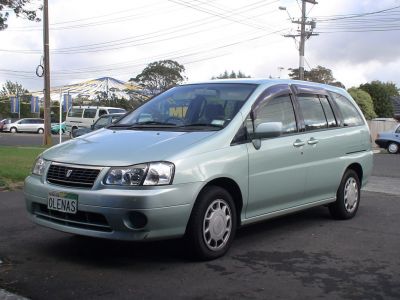 2002 Toyota Avensis Verso Dimensions, Size & Specs
2002 Toyota Avensis Verso Dimensions, Size & SpecsMeasurements of the 2002 Toyota Avensis Verso, engineered for optimal performance and comfort
| Dimensions | |
|---|---|
| Length: | 4650 mm183.1 in15.3 ft |
| Width: | 1760 mm69.3 in5.8 ft |
| Height: | 1675 mm65.9 in5.5 ft |
| Trunk Capacity: | 282 liter10.0 cu ft |
| Trunk Capacity (Max): | 2422 liter85.5 cu ft |
| Weight Specifications | |
| Curb Weight: | 1495-1600 kg3296-3527 lbs |
| Maximal permitted Weight: | 2140-2250 kg4718-4960 lbs |
| Tire Specifications | |
| Rims Size: |
|
| Tire Size: |
|
The 2002 Toyota Avensis Verso represents the Avensis Verso generation produced between 2001 and 2003, offering a practical and spacious minivan option in Toyota's lineup. This vehicle features a length of 4650 mm (183.1 inches), a width of 1760 mm (69.3 inches), and a height of 1675 mm (65.9 inches), making it a balanced-sized family minivan that is user-friendly in urban and suburban environments. The curb weight ranges from 1495 kg to 1600 kg (3297 lbs to 3527 lbs), while the maximum weight the vehicle can safely carry varies from 2140 kg to 2250 kg (4717 lbs to 4960 lbs), reflecting its robust build and versatility. The 2002 Avensis Verso offers significant luggage capacity with 282 liters (9.96 cubic feet) available with all seats in place, expanding impressively to 2422 liters (85.56 cubic feet) when the rear seats are folded down, ideal for accommodating larger loads or family travel gear. This generation rides on 15-inch rims fitted with 205/65 R15 tires, contributing to a stable and comfortable ride. Overall, the Toyota Avensis Verso is a well-dimensioned and practical choice for families needing flexible seating and cargo solutions without sacrificing maneuverability or everyday usability.
Discover the standout features that make the 2002 Toyota Avensis Verso a leader in its class
Have a question? Please check our knowledgebase first.
The Toyota Avensis Verso, produced from 2001 to 2003, measures 4650 mm (183 inches) in length, 1760 mm (69.3 inches) in width, and 1675 mm (65.9 inches) in height. These dimensions position it firmly within the mid-size minivan segment, offering a spacious cabin while maintaining manageable external proportions for urban and suburban driving. The length of about 4.65 meters allows decent interior volume without becoming cumbersome in regular traffic or parking situations. The width of 1.76 meters ensures the vehicle remains narrow enough for city streets and moderate parking spaces, while the height of 1.68 meters enhances headroom and visibility but requires attention in low-clearance parking garages. Overall, these proportions balance passenger comfort and practical handling, though the driver should be mindful of the minivan's taller stance relative to standard cars when navigating tight spaces.
The Toyota Avensis Verso's curb weight ranges between 1495 kg and 1600 kg (approximately 3298 to 3527 lbs), depending on the specific trim level and equipment. This weight bracket is typical for a mid-size minivan equipped with family-oriented features and safety equipment. A curb weight in this range generally results in stable and confident road manners but can slightly moderate acceleration and fuel consumption compared to lighter vehicles. The engine is tuned to handle this mass efficiently, ensuring that performance remains adequate for daily driving needs. However, the minivan's comparatively heavier frame influences fuel economy, making it slightly less efficient than smaller sedans or compact cars, averaging medium-range consumption figures typical for its class in the early 2000s.
The Toyota Avensis Verso offers notable versatility in cargo space, catering well to family and utility needs. With all rear seats in place, it provides a luggage capacity of 282 liters (about 10 cubic feet), suitable for everyday grocery runs or travel bags. When the rear seats are folded down, the available cargo space dramatically increases to 2422 liters (approximately 85.5 cubic feet), allowing the transport of larger items such as furniture, bulky luggage, or sports equipment. This expansive cargo area is especially advantageous for owners requiring a vehicle capable of switching between passenger transport and heavy cargo carrying without difficulty, making the Avensis Verso a practical choice in the minivan segment.
The Toyota Avensis Verso has a width of 1760 mm (69.3 inches) excluding mirrors, which is a common measurement when assessing a vehicle's ability to fit through narrow spaces. Including the mirrors, the width can safely be assumed to increase by approximately 150-200 mm (6-8 inches), given typical mirror sizes, resulting in roughly 1910-1960 mm (75-77 inches). Despite this, the minivan remains maneuverable enough for most urban environments, though drivers should remain cautious when navigating extremely tight or congested streets, particularly in older city centers with narrow lanes. Its width is slightly more than average sedan widths but remains manageable in everyday traffic and parking scenarios.
With a height of 1675 mm (65.9 inches or about 5 feet 6 inches), the Toyota Avensis Verso is relatively tall compared to typical passenger cars, reflecting its minivan classification. Most standard home garages have clearance heights ranging from 2,100 mm to 2,400 mm (82.7 to 94.5 inches), which means the Avensis Verso will comfortably fit inside typical residential garages without any clearance issues. However, owners should remain mindful of any garage shelving, fixtures, or storage systems that could reduce overall internal height and ensure no modifications obstruct the space. Its height also contributes to good interior headroom for passengers but slightly raises the vehicle’s center of gravity compared to sedans.
The Toyota Avensis Verso is equipped with 15-inch rims paired with 205/65 R15 tires as standard. These dimensions suit its minivan design, prioritizing passenger comfort, road grip, and fuel efficiency. The 205 mm tire width offers a good balance between stability and rolling resistance, while the 65% aspect ratio results in a relatively tall sidewall that helps absorb road imperfections. Together, these tire specifications contribute to a smooth ride quality on various surfaces and good traction in typical driving conditions. The 15-inch wheel size helps maintain a compliant suspension setup, essential for carrying multiple passengers and cargo without compromising comfort.
The Toyota Avensis Verso was introduced as a successor to the Toyota Avensis Estate in terms of offering more spacious and versatile family-oriented transport but specifically targets the minivan segment rather than a traditional estate/station wagon. When compared to predecessors like the Toyota Avensis Estate, the Verso delivers significantly more interior space, higher seating capacity (offering three rows), and flexible cargo configurations, with its 4650 mm length and 1675 mm height underscoring a more substantial presence geared toward larger families or groups. While the Avensis Estate models emphasized a sportier wagon style, the Verso prioritized comfort and utility, effectively bridging a gap between sedans and larger vans. Practical features such as foldable rear seats and a much larger cargo area with the seats down (2422 liters) make the Avensis Verso notably more versatile.
The Toyota Avensis Verso stands out in the early 2000s minivan market by offering a well-rounded package emphasizing reliability, practical interior space, and comfortable ride quality. Dimensionally, it is slightly more compact than larger rivals like the Volkswagen Sharan or Ford Galaxy, with its 4650 mm length making it easier to handle in urban settings without compromising interior space excessively. Its luggage capacity of 282 liters with seats up and an impressive 2422 liters with folded seats is competitive, providing excellent versatility. Toyota's reputation for durability adds to the appeal compared to European models, which often commanded a premium. While lacking some of the more luxurious features seen in competitors, the Avensis Verso is typically more affordable and economical to maintain, making it an ideal choice for families seeking value, space, and reliability.
The Toyota Avensis Verso has a maximum authorized (gross) weight ranging between 2140 kg and 2250 kg (approximately 4717 to 4960 lbs). This means that, beyond its curb weight of 1495-1600 kg, the vehicle can legally carry an additional load of around 540-750 kg including passengers, cargo, and accessories. Such a capacity supports a full load of passengers—typically seven in a three-row seating configuration—and luggage or equipment for long trips or daily activities. It underscores the Avensis Verso’s suitability as a multi-purpose vehicle that can transition from carrying a full family to transporting bulky items. Careful consideration of the maximum weight helps maintain vehicle safety, performance, and suspension longevity.
The Toyota Avensis Verso, with its 4650 mm total length and 1760 mm width (excluding mirrors), fits comfortably within most urban residential garages and standard parking spaces. Its minivan dimensions are moderate compared to larger full-size vans, making it easier to park and maneuver in city environments. While the relatively tall height of 1675 mm requires attention under low-clearance areas, typical multi-level parking garages accommodate it without issue. Additionally, the vehicle benefits from a turning radius typical for minivans, allowing for reasonably tight cornering in urban maneuvering. Drivers transitioning from compact cars may need a brief adjustment period to the longer length and height, but overall, the Avensis Verso remains practical for urban settings without sacrificing interior space or comfort.
Discover similar sized cars.

| Production: | 1998-2002 |
|---|---|
| Model Year: | 1998 |
| Length: | 4545-4575 mm178.9-180.1 in |
| Width: | 1695 mm66.7 in |
| Height: | 1630 mm64.2 in |

| Production: | 2001-2009 |
|---|---|
| Model Year: | 2001 |
| Length: | 4650 mm183.1 in |
| Width: | 1760 mm69.3 in |
| Height: | 1680 mm66.1 in |

| Production: | 2004-2009 |
|---|---|
| Model Year: | 2004 |
| Length: | 4610 mm181.5 in |
| Width: | 1695 mm66.7 in |
| Height: | 1640 mm64.6 in |

| Production: | 1998-2004 |
|---|---|
| Model Year: | 1998 |
| Length: | 4620 mm181.9 in |
| Width: | 1695 mm66.7 in |
| Height: | 1640-1665 mm64.6-65.6 in |
